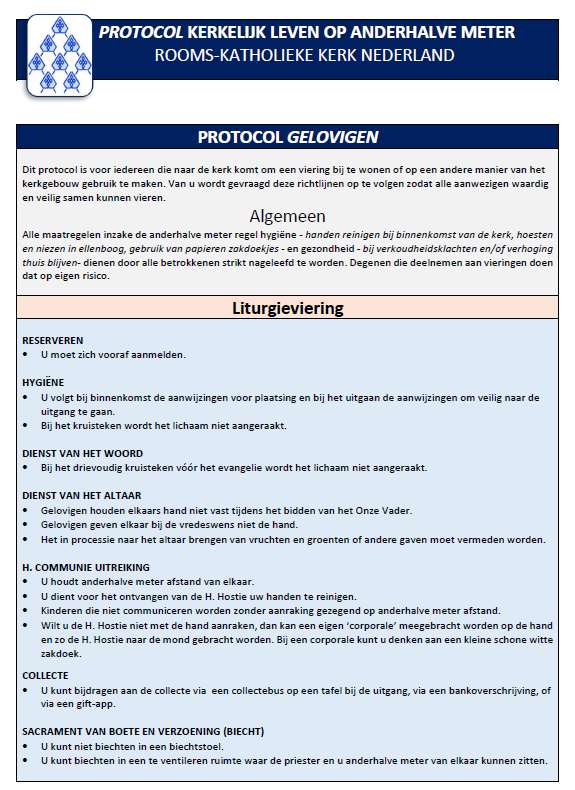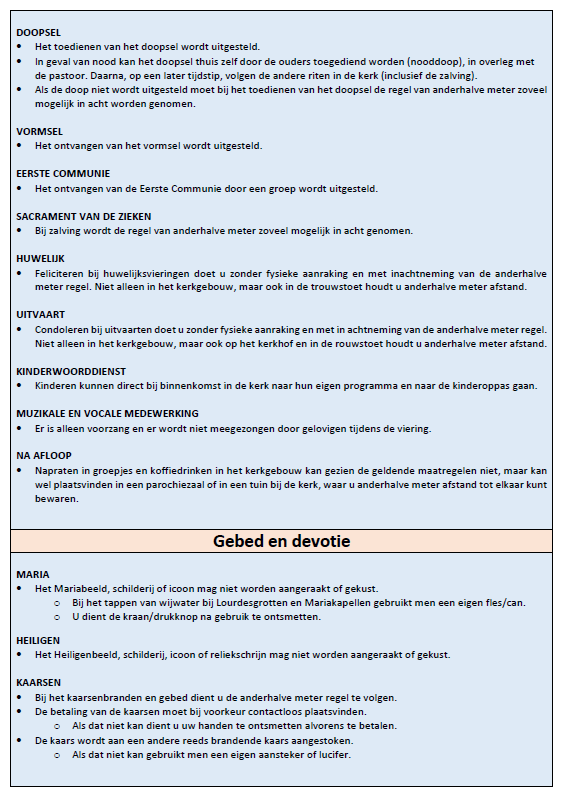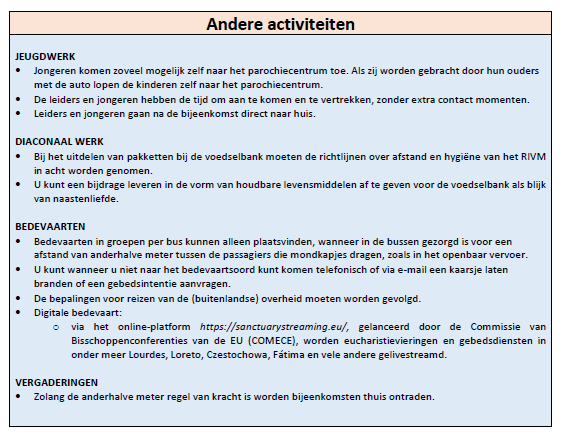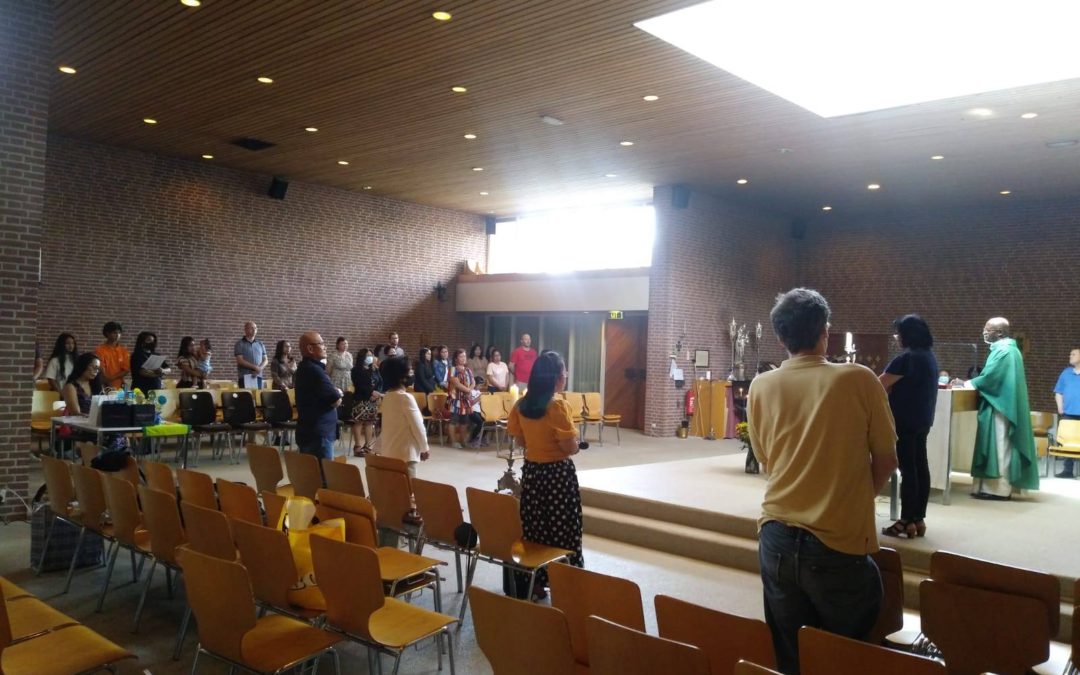
Jul 27, 2020 | Events, News & Updates
The regular 4th Sunday mass celebrated by the Filipino Catholic Community of Gouda & Surroundings is back! On July 26, 2020, the community happily celebrated the mass at OLV Hemelvaartkerk after months of COVID-19 lockdown. Every year, FCC-Gouda celebrates Family Fun Day, a social gathering of all members of the community and their families for merriment, fellowship, and communal dining. But due to COVID-19-related restrictions, this year’s Family Fun Day celebration is cut into an hour gathering with few games, just drinks, and the annual raffle draw fundraising event.
FCC-Gouda needed to raise funds and push through with the planned raffle draw despite the foreseen difficulty of selling tickets and possibility of a cancelled event. By God’s grace, the 4th Sunday mass at the church and the Family Fun Day gathering and fundraising went through successfully. Winners of the raffle draw are as follows:
GRAND PRIZE WINNERS
1st Prize (€75): Ticket # 101— Fr. Marcel Uzoigwe
2nd Prize (€50): Ticket # 384 — Eva Donaire Kroeze
3rd Prize ( €25): Ticket # 602 — Elma May Lich-Asumbrado
CONSOLATION PRIZES
- Gift Certificate (€20) Donated by Aziatisch Kleding Reparatie: Ticket # 317 — Joy Bouma
2. Gift Certificate (€15) Donated by Aziatisch Kleding Reparatie: Ticket # 842 — Norma Reyes
3. Gift Certificate (€15) Donated by Aziatisch Kleding Reparatie: Ticket # 824 — Dulce Permanes
4. Jewelry Accessories: Ticket # 850 — Christy de Jong
5. Grocery Items: Ticket # 310 — Joy Bouma
6. Grocery Items: Ticket # 103 — Fr. Marcel Uzoigwe
7. Set of Wine Glass: Ticket # 305 — Joy Bouma
8. Set and saucer: Ticket # 230 — Tess van As
SPECIAL PRIZE
Best Raffle Ticket Sellers: Marivic Adema & Susan Horn-Perez
YOU ARE ALL WINNERS! To all who supported us for this cause, from producing the raffle tickets to giving your donations for the prizes, selling the raffle tickets, buying the tickets with a cheerful heart, consolidating all sold tickets, drawing the winners, and making a financial report, THANK YOU VERY MUCH! Together, we’ve raised a total of €465!
WORDS OF THANKS FROM THE FCC-GOUDA BOARD
Dear Brothers & Sisters in Christ,
Thank you so much for your continuous support to our once-a-year celebration of Family Fun Day of the Filipino Catholic Community of Gouda and Surroundings. We are very happy to have you. Your donations have been able to help our activities & diaconal work. Your continuous support helps us build a strong foundation that fosters growth and enriches the worship life of the Christian community. You make the difference, especially in this time of crisis. Your help sustains our mission, and we are sincerely grateful for all your help and support.
Our special thanks to our volunteers and donors:
- Marivic Adema
- Myra Colis
- Elpi de Clercq
- Elpi Aziatisch Kleding Reparatie
- Susan Horn-Perez
- Mar Jane Streefland
- Amor van Os
If you have any questions regarding our work and how the proceeds will be put to use, please do not hesitate to contact us.
With much appreciation and thanks,
The FCCG Board
RECORDING ALSO AVAILABLE
July 26, 2020 4th Sunday Mass Online
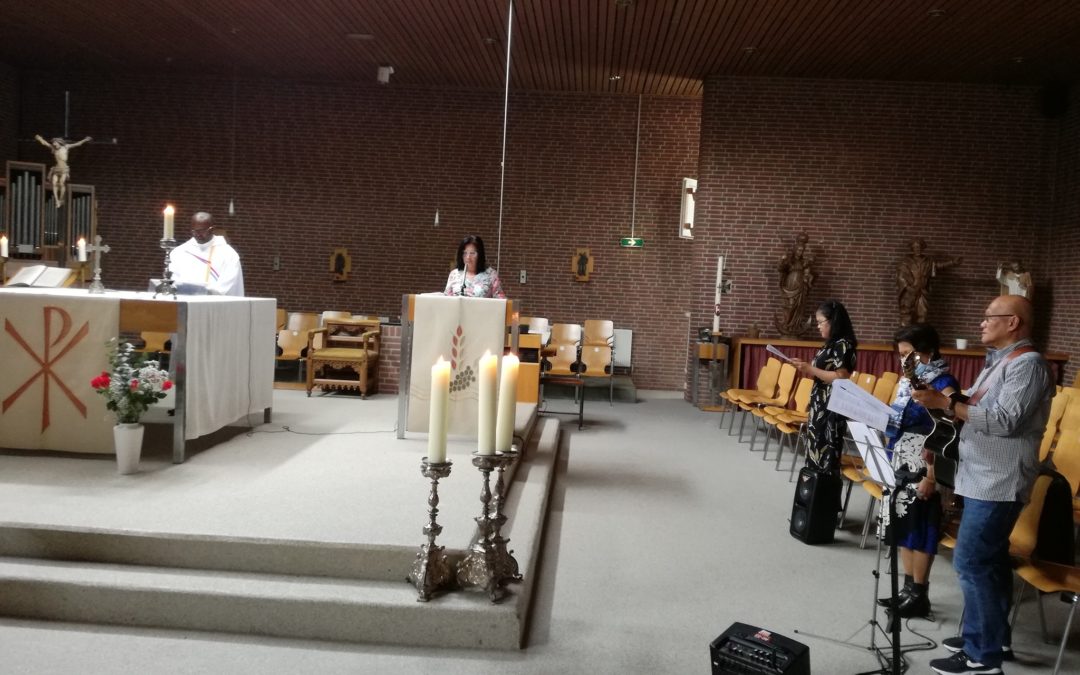
Jul 12, 2020 | News & Updates
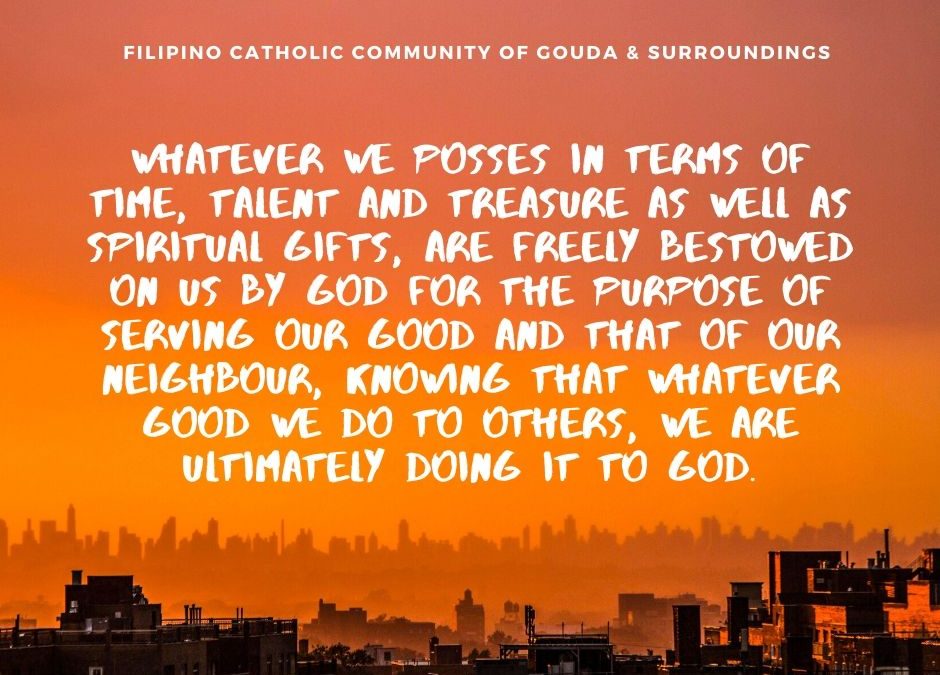
Jun 29, 2020 | Homily
By Fr. Marcel Uzoigwe, CSSp
(2 Kings 4:8-11, 14-16a; Romans 6:3-4, 8-11; Matthew 10:37-42)
Dear friends in Christ,
We often presume that others are the beneficiaries of whatever we are generous with, whereas we are actually the ones who reap from our acts of generosity. It is interesting to know that our acts of generosity serve to supply what we lack, and everyone lacks something in life, either materially or spiritually. The facts that “it is in giving that we receive” (St. Francis) and “it is more blessed to give than to receive.” (Acts. 20:35) are clearly highlighted in the readings of today. They also portray love as the driving force of generosity.
The first reading presents the wealthy but childless Shunammite couple. What makes this couple exceptional is the ability to feel the sufferings of others, shown in the initiative they took to alleviate the suffering of Elisha. They provided bed and board for Elisha each time he came across. The process was set in motion by the woman, and her husband must be a good and generous man to be open to her suggestion to furnish a little room for Elisha in their house so that he could always have a place to rest during his journey. Their generosity was matched and surpassed by God who granted them a son according to the words of Elisha: “This time next year you will be fondling a baby son” (2 Kings 4:16).
Hospitality is a form of generosity, and it is one of the greatest virtues in the Bible. The ancients believed that each person should be welcomed as though one were welcoming God himself. The virtue of hospitality is encountering the presence of God in others, usually in those whom we least expect. This reminds us of a similar story found in the eighteenth chapter of the book of Genesis, where the old man Abraham and his aged wife Sarah welcomed and entertained three strangers. But they never knew that the travelers were actually God’s messengers. And in a year, Abraham and Sarah had a baby boy whom they named Isaac. Many a time we miss to welcome God who visits us in a way we never expected Him to.
For those who know how to listen, like the Shunammite couple, they hear the voice of God inviting them to take action. Despite the attendant dangers in doing good for others—peoples incomprehension—they trust that God sees their hearts and good intentions. Such people get surprised by God. The Shunammite couple couldn’t buy a child, in spite of their wealth; but they received a gift of a son, through the prayers of the prophet. Note that when God called Elisha, he cooked his farm animals and fed his workers with the meat—his whole wealth and source of livelihood disappeared in a single day (1 Kings 19:19-21). He too was generous with his material possession, but even more in dedicating his life to God’s service with the attendant material poverty and dependency that go with it.
The gospel deals with excessive attachments which restrict our generosity and freedom to do God’s work accordingly; something that St. Ignatius of Loyola would call ‘inordinate affection’. To demonstrate to us that charity or generosity with our gifts to others is not easy, three classes of excuses we usually give for refusing to be generous are presented to us: responsibilities to our parents, children and preservation of our wealth. Against these excuses, Jesus warns that “whoever loves father or mother more than me is not worthy of me, and whoever loves son or daughter more than me is not worthy of me; and whoever does not take up his cross and follow after me is not worthy of me” (Matthew 10:37-38). By demanding that we prioritize his call to serve above every other human consideration or family ties, Jesus affirms the very principle of love as the driving force for generosity which looks beyond the individual to see God in human persons. Thus, when we are generous to a person, it is actually to God that we are generous. We see this also in the statement of Jesus concerning the last judgement, “Truly I tell you, whatever you did for one of the least of these brothers and sisters of mine, you did for me.” ( Mathew 25:40).
What goes on in our minds when we see people in difficulty or suffering? Do we simply get angry and place the blame on institutions and governments for wrong policies or do we think their situation calls us to take action? Bad policies do lead to people suffering, but it is not just the anger against institutions and governments that matter; rather, our ability to be generous towards them.
Generosity does not require a great deal of wealth, for anyone to feel dispensed from it; a cup of water to a thirsty person suffices as generosity: “And whoever gives only a cup of cold water to one of these little ones to drink because he is a disciple – amen, I say to you, he will surely not lose his reward” (Matthew 10:42). Everyone is rich enough to share something, no matter how little, with others. It is sin – especially greed and lack of faith – that prevents us from sharing with others. The solution to this sin, given in the second reading, reminds us that our sinful nature died with Christ in baptism. We must therefore consider ourselves dead to sin and alive with God in Jesus Christ (Romans 6:11). If we are still stingy and unfeeling towards people who suffer, our claim to Christianity is questionable. We must be supportive to anyone who needs what we can offer.
Generosity goes beyond material giving. The very source and origin of generosity is God himself. He made us freely in his own image and likeness and generously gave us the entire creation to manage (Gen. 2:26). After the fall of Adam and Eve that brought us death, God’s generosity gave us salvation. Thus generosity is an expression of the person of God which is love itself (1 John 4:8). In John 3:16 we read, “For God so loved the world that he gave his only Son, that whoever believes in him shall not perish but have eternal life”. It is God’s gift of His Son that enables us to be generous like Him. We can then offer our time, attention, services, resources cheerfully without grudging. It also enables us to see something good in everyone, feel their pains and seek to help them in ways we can. The greatest form of generosity is to lead the sinner and those going astray to salvation, and to be part of the salvation ministry which is the very reason Jesus emphasized on generosity given to prophets, apostles, disciples and ‘the little ones’.
Let us realize that whatever we posses in terms of time, talent and treasure as well as spiritual gifts, are freely bestowed on us by God for the purpose of serving our good and that of our neighbour, knowing that whatever good we do to others, we are ultimately doing it to God.
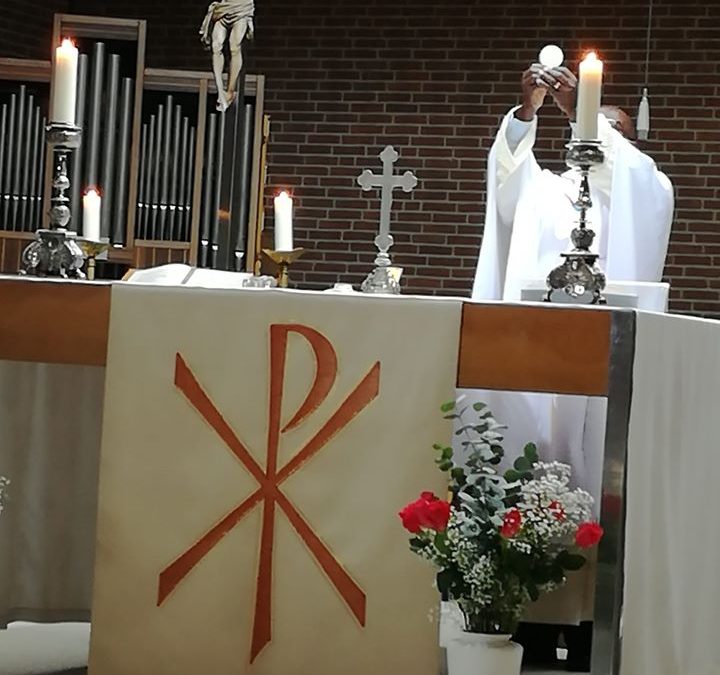
Jun 15, 2020 | Homily
By Fr. Marcel Uzoigwe, CSSp. (Deut. 8:2-3,14-16, Ps.147:12-20, 1Cor. 10:16-17 & Jn.6:51-58)
Dear friends in Christ,
Today the Church celebrates the Solemnity of the Corpus Christi (Body and Blood of Christ) which is at the very center of Catholic spirituality. Ever since the institution of the Eucharist in the Upper Room by Jesus with the mandate “Do this in memory of me”, (Luke 22:19, 1Cor.11:24,25), the Church has in obedience gathered regularly in the name of Jesus to do and say what the Lord Jesus did and commanded at that last supper. By this establishment, Jesus really wants us to keep celebrating and living out his life and message as Eucharistic people and also to draw life from his Body and Blood which sustains us in our pilgrimage to eternal life.
The three readings of today deal with the subject of Jesus as the Bread of Life from different perspectives. In the first reading, Moses calls on the Israelites to remain faithful to God who led them through the desert for forty year, feeding them with manna, the bread of heaven. He described this bread as something uncommon and unknown to their fathers; something that God alone bestows on his people out of love, to strengthen them on their difficult journey through the desert. Moses pointed out that the event of feeding the Israelites with the manna coupled with the circumstances of their painful journey obliges them to realize that there is more to life than bread and butter. They are called to live by every word that comes from the mouth of God. In other words, they are called to obedience of faith – living by God’s commandments and standard so as to remain the people of God, pleasing to Him. Their unity as a people derives not only from their common ancestry but also from their faithfulness to God who has claimed them as His own and saddled Moses with the task of leading them out of slavery to the freedom that befits the children of God.
Paul takes up this theme with the early Corinthian Christians who were besieged with various pastoral problems. He cautioned them on the dangers of neither according the Body and Blood of Christ the dignity it commands nor living according to its demands. Sharing the one body required them to be united in love for one another, working for the good of all rather than seeking individual interests in ways that harm the community of believers. Being a Jew did not blind St. Paul from realizing Jesus as the new source of unity among the believers rather than ancestral descent. If anyone is in Christ, he is a new creation: The old has gone, the new is here (2 Cor. 5:17). He or she is a member of the new community of the people of God.
Partaking of the body of Christ implies being one with Jesus. The consequence of this event is enumerated in the earlier verses (verses 1-15) of the 1Corinthians 10 out of which today’s reading consists of only versus 16 and 17. St. Paul connects there the dangers of unworthy participation in the Eucharist with the Israelites at the time of Moses who ate the manna in an unworthy manner, and consequently died in the desert. They were, so to say, the rotten part of the body, and therefore unworthy to remain united with the rest. Paul warns us that sin makes us unworthy and has an unpleasant effect when we approach the Eucharist. We need to be prepared because we are dealing with God who is holy and almighty.
The question of true presence of Jesus in the Eucharist is the subject of the Gospel reading. In spite of Jesus’ declaration that the bread and wine are his true body and blood, this discussion has continued until this day. Down through the ages many heretics doubt and deny the real presence of Jesus in the Eucharist. For some it is impossible to be true while for others, Jesus’ real presence is limited within the time of the Eucharistic celebration but not after the celebration.
The importance of this teaching of Jesus led Pope Urban IV to establish Corpus Christi as a Feast for the universal Church in 1264 and Pope Clement V made it an obligatory feast for the universal Church at the Council of Vienna in 1311. The Church takes this teaching serious because it was Jesus who made this statement “I am the bread of life”. He didn’t stop there, he went on to say that, this bread is my flesh. So the bread you see is God whole and entire, body and blood, soul and divinity. The bread is not a pointer, but Jesus himself who continues to offer himself to us. Again, during the Last Supper, “while they were eating, Jesus took bread, and when he had given thanks, he broke it and gave it to his disciples, saying, “Take and eat; this is my body.” Then he took a cup, and when he had given thanks, he gave it to them, saying, “Drink from it, all of you. This is my blood of the covenant, which is poured out for many for the forgiveness of sins”(Matthew 26: 26-28). Searching for the very words of Jesus in the scriptures (ipsissima verba), scholars found that these were the actual words of Jesus himself. He said, “this is my body, this is my blood” and not “this represents my body, this represent my blood”. Corpus Christi Feast was, therefore, established in order to re-assure the Christian Faithful of Christ’s ever abiding real presence in the Eucharist as opposed to the heretical doubt and denial of the real presence of Jesus in the Eucharist.
In the light of our great celebration today, the big question that confronts us is, to what extent do we really believe in the Eucharistic Jesus and His ever abiding real presence, and how has the celebration of the Eucharist positively transformed us as individuals and united us as a community of faith where the life of Jesus is replicated in our dealings with one another? The early Church gives us an example of living as a community of faith. Acts 4:32 says, “all the believers were one in heart and mind.” And when problems started arising, the apostles chose men full of the Holy Spirit and wisdom to handle the situation and maintain unity among the brethren (Acts 6:1-3).
The feast of the Body and Blood of Jesus (Corpus Christi) reminds us of who we are: the people of God on a journey to our eternal home in heaven. While here on earth, we are united with God, protected and strengthened by the body and blood of Christ we celebrate. It is our responsibility to remain united with Him, helping one another with the realization that we are members of the one body, and the journey could sometimes be more difficult for one or more of our members. In this regard, let us heed to the admonition of St. Paul in Romans 15: 1-3, “we who are strong ought to bear with the failings of the weak and not to please ourselves. Each of us should please our neighbors for their good, to build them up. For even Christ did not please himself but, as it is written: ‘The insults of those who insult you have fallen on me’”.
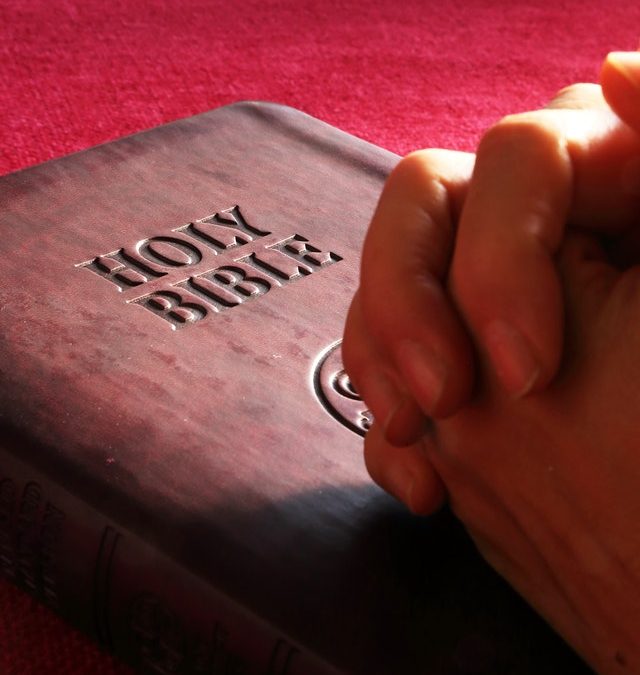
May 25, 2020 | Homily
By Fr. Marcel Uzoigwe, CSSp. (Acts: 1, 1-11; Eph. 1, 17-23; Mt 28, 16-20 )
Dear friends in Christ,
Today we celebrate the Ascension of our Lord Jesus into heaven. The first reading details the account of the Ascension while the gospel deals more with the account of the commission of mission to the nations. The second reading places us before God to be filled with the Spirit of wisdom and knowledge without which we cannot bear true witness to Jesus.
The Ascension is an event that opens a very important dimension to the Christian faith. When Jesus rose from the death, he gave us the assurance that all who believe in him will have life beyond the physical death. By the fact of his resurrection Jesus gave a new dimension to his teaching in the house of Mary and Martha before the event of rising Lazarus from the death when he said to Martha, “I am the resurrection and the life; he who believes in Me will live even if he dies, and everyone who lives and believes in Me will never die” (John 11:25-26). From this very moment in the Gospel narrative of John, Jesus furthered his teaching on the resurrection, using every opportunity to teach his disciples that the Son of Man will suffer and be put to death, but on the third day he will rise again. The resurrection was something more than a physical event in a space-time limit as in the case of Lazarus. What resurrection really meant was not clear to the disciples at this time.
As the disciples continued to wonder about the mystery of the resurrection, Jesus introduced in John 14 the concept of his ascension into heaven saying that he would go to the Father. He wasn’t going to be in heaven alone, but he would go to prepare a place for his disciples and all who will come to believe in him so that they could be together again. This is true to the prayer of Jesus in John 17:20-21 that all those who will come to believe through the words and messages of his disciples may all be one in Him even as He is one with the Father. The ascension is an assurance of life with Jesus in heaven when the battle of life is won by being his true disciple through living according to his commandments and witnessing to him here on earth. It is the glory that God has prepared for us, to be with us forever. That is the aspiration of every believer – to be with God forever in His glory.
In today’s first reading from the acts of the Apostles, which is a somewhat continuation of Luke’s gospel narrative, we see the sequence of events up to the ascension of Jesus into heaven. While still in the presence of his disciples moments before ascending into heaven, Jesus gave them specific instructions not to go away from Jerusalem until they have received the promise of the Father, The Holy Spirit. The Holy Spirit will empower them to be his witnesses in Jerusalem, throughout Judea and Samaria, and to the ends of the Earth. The gospel account of his resurrection we read today describes the same event with greater emphasis on the commissioning of the disciples to go make disciples of all nations, ‘baptizing them in the name of the Father, and of the Son and of the Holy Spirit’ knowing that Jesus is with them till the end of the age (Matthew28: 19-20). The commissioning to witness comes from Jesus to all the baptized who in turn are empowered by the Holy Spirit, the gift of the Father.
The second reading leads us through a beautiful prayer and a sincere wish that God gives each and everyone who believes in Him (you and I) the Spirit of wisdom and revelation resulting in knowledge of Him. True knowledge of God offers us the right predisposition to grasp our position in His plan of salvation, but also to understand how richly blessed we are in Christ. It enables us to place the death, resurrection and ascension of Jesus in the right perspective so that we can understand the call His Spirit makes on us to be his witnesses in the present time. The author of the letter to the Ephesians touches on the rich position of the Christian who enjoys the backing of Jesus because Jesus wields power over all the principalities and powers. Thus, we Christians need to be bold in the face of present apathy and challenges towards witnessing to Jesus in our secular society.
Christians sometimes feel shy to speak of Jesus in public or around circle of friends, partly because they feel their lives are not completely measuring up to the Christian values. But that should not be a hindrance. While working to live the call to perfection, lets not forget what Paul said in 2 Corinthians 4: 7, “we have this treasure in jars of clay to show that this all-surpassing power is from God and not from us.” In today’s gospel, some of the disciples doubted Jesus, even in his presence (Matthew 28:17). But their doubt did not stop Jesus from commissioning them because He knows that by witnessing to something, one begins to align his or her thoughts and lifestyle towards it. The failure to witness weakens the commitment to act in line with what one witnesses to, and vice versa. In his speech to declare churches and places of worship as essential places that need to be opened, Donald Trump said something that one rarely hears from politicians, “In America, we need more prayers, not less.” Whatever one may think of this, it is a bold speech to publicly recognize the place of God. In the fight against the Covid-19 pandemic or other global challenges, there has been some tendency to think that humanity is capable of handling the situation outside of God. There is the arrogance to arrogate successes to ourselves as if we could achieve it if God was not on our side. This secular tendency often results in statements that show how far the modern man has failed to recognize the presence of God in his daily activities. When the New York governor was warning against reopening places of worship, he was bold to say, ‘the number is down because we brought the number down. God did not do that’. While unbeliever are bold to air their faithlessness, modern Christians, and even religious leaders, have become naive to speak openly about God. That is unfortunate.
The situation in which Jesus commissioned his disciples to ‘go make disciples of the nations’ was more hostile tot he gospel than that of today. It was the society that crucified their master; a society that perceived ‘the Way’, as the new teaching was called, as something very dangerous, such that it was met with heavy persecution (Acts 8:1). Yet they traveled all through the known world of their time proclaiming the gospel. We too are being commission by Jesus today, on his ascension event, to go make disciples of all the nations using the communication media available to us in the present age. That is why we celebrate the world communication day today.
Communication is not a complex word. It simply means the imparting or exchanging of information by speaking, writing, or using some other medium. Communication is vital to humans as social beings. We engage in it every now and then. Various electronic communication media in use has bridged the geographical distance between people. The present Covid-19 pandemic has shown how the electronic media, has become part of our lives. This Eucharistic celebration is possible thanks to this communication channel that makes it possible for us to be united in worship. The challenge today is to employ these communication media for purposes that promote the kingdom of God on earth. There is so much going on with the social networks, YouTube, blogs, internet channels, and even on the older media as the television and radio. How much of them promote the glory of God and the dignity of the human person? The Church calls on us to evaluate our use of them and find ways to employ them in the spreading of the gospel and promotion of the good purpose for which we are created.
Let us pray that we may be true disciples of Jesus who employ every means available to us to fulfill the mission of witnessing to him in the present life so as to ascend with him to heaven when our time here on earth is over. May God bless you and fill you with his love… Amen.



